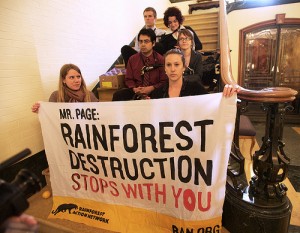
After months of waiting for the results of the Sinar Mas “audit,” the controversial findings are finally public and it’s now up to Cargill executives to decide how they will proceed, i. e. whether or not to sever ties with the company known for its rainforest destruction and unsustainable palm oil practices.
Read our open letter to Cargill below:
August 10, 2010
Mark Murphy
Assistant Vice President, Cargill Corporate AffairsMark,
As you know, Sinar Mas released the controversial findings of their PT Smart audit today, with hopes of using it to clear their name of rainforest destruction and social conflict associated with their palm oil plantation operations. Rainforest Action Network stands with Greenpeace, Unilever, and many others in rejecting this audit as being neither comprehensive nor representative of PT SMART’s palm oil operations. We hope that you’ll view this attempted greenwash by Sinar Mas as another sign that the company is not moving forward in good faith towards more sustainable palm oil production.
Problems with the Sinar Mas “audit” that merit immediate action:
- Although the official complaint against Sinar Mas filed at the RSPO put into question the company’s violations of RSPO principles and criteria, this audit is an initiative of PT SMART and is too limited in scope to provide an accurate assessment of the Sinar Mas Group
- Further, this “audit” only looks at three PT SMART concessions covering 40% of its plantations area; it does not assess the rest of PT SMART’s concessions including those in Papua or the larger holdings of Golden Agri Resources (GAR), and is therefore not comprehensive enough to provide an adequate assessment of its palm oil plantation practices
- The audit shows that PT Smart has destroyed carbon rich peatlands and cleared rainforests for conversion to palm oil plantations
- The audit is not based on RSPO Principles and Criteria nor Sinar Mas’ adherence to them
In sum, the “Independent Verification Report” that PT Smart paid for and just released is being used by Sinar Mas as a smokescreen to distract attention from what we know to be the many real negative impacts on the ground from their operations on the Islands of Sumatra, Borneo and upcoming threats in New Guinea. This strongly reinforces the widely held view that U.S. based companies like Cargill cannot rely on Sinar Mas’ misleading claims of sustainability and should reject them.
We are aware that Cargill is “reviewing the results and discussing them with PT SMART in the next few days to decide how [you] wish to proceed.” We urge you to make a formal response to our concerns and to take proactive action now and cancel all direct and indirect contracts with Sinar Mas.
Sincerely,
Bill Barclay
Corporate Communications & Interim Program Director
Rainforest Action Network

So what does this mean for U.S. companies that have palm oil in their supply chain? Well, for starters, it serves as strong proof that palm oil is an increasingly controversial and risky commodity due to its negative impacts on tropical rainforests, the climate, critical habitat for endangered species, as well as diverse communities of people that rely on healthy forests for their livelihoods.
Market leader companies like Unilever, Nestle and Kraft have already distanced themselves from Sinar Mas to disassociate their brand from rainforest destruction, and all but Kraft have adopted strong policies to ensure they are not a part of the problem but rather part of the solution. Will General Mills and Cargill follow suit? It’s time that all U.S. companies get out of this problem and embark upon the pathway to change.